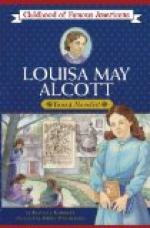|
This section contains 8,168 words (approx. 28 pages at 300 words per page) |

|
SOURCE: "Moods," in A Hunger for Home: Louisa May Alcott and Little Women, Temple University Press, 1984, pp. 102-18.
In the following chapter from a critical study of Alcott, Elbert examines how Alcott's novel Moods examines social and moral questions associated with relationships between the sexes.
Life is a train of moods like a string of beads, and as we pass through them they prove to be so many coloured lenses, which paint the world their own hue and each shows us only what lies in its own focus.
R. W. Emerson, "Experience, " 1844-45
In 1865 Henry James Jr. dismissed Moods as an unconvincing version of "the old story of the husband, the wife and the lover."1 Since a thirty-year-old spinster author could scarcely possess much insight into the eternal triangle, James assumed that the attempt to deal with any deeper problem was laughable. "Has Miss Alcott proposed to give...
|
This section contains 8,168 words (approx. 28 pages at 300 words per page) |

|


